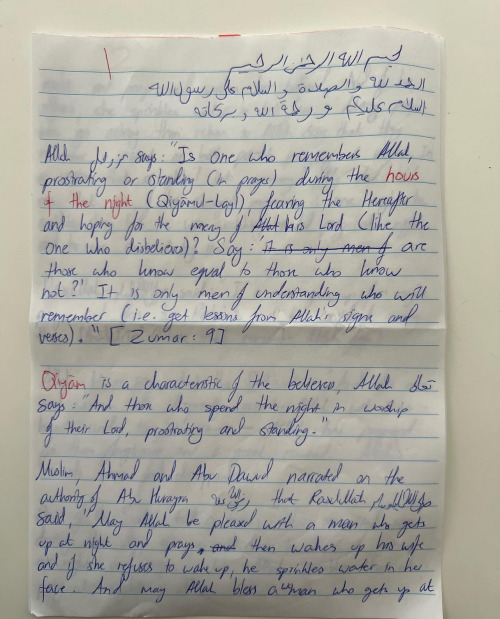The Qur’an Is To Be Acted Upon!
The Qur’an is to be acted upon!
When you read the Quran and come across “O you who have believed”, do you think that those who have believed are living on Mars? No, Allah is addressing you! You are among those who believe. And when you come across “O mankind”, do you think mankind is living on Saturn? Pay attention—you are part of mankind.
When commands and prohibitions appear in the Quran, they are not just directed at Abu Bakr and Umar رضي الله عنهم. They are directed at you. These commands and prohibitions are meant specifically for you. The Quran does not only address the Muslim community as a whole—it addresses each and every individual Muslim personally. Every single person is being addressed directly by the Quran.
So when you read these verses, understand that they are messages from Allah to you. Read them as if a servant is reading the commands of his master with purpose and intent. Imagine a slave whose master sends him written instructions—commands and prohibitions in a letter. The worker receives this letter, kisses it, places it on his head, perfumes it and puts it on a shelf. But that’s all he does. He doesn’t follow the instructions.
Now, if the master later asks him, “What did you do with my message?”, and the worker replies, “I received it, kissed it, perfumed it, placed it on the shelf, and every day I take it down, kiss it again, read it, and put it back.”—what will the master do? He will hit him! He will say, “Did I send this letter just for you to honor it, open and close it, and place it on a shelf? Or did I send it for you to act upon it?”
Likewise, the Quran is not just meant to be recited and admired—it is meant to be followed. That is why the Prophet ﷺ said, “The Quran is either a proof for you or against you.”
So if you read “O you who have believed”, but then act like those who disbelieve, how will you answer Allah when you meet Him? Allah will surely question you about what you recited.
-Shaykh Muhammad Bin Abd-Al Hameed Bin Abdullah Al Zubaydi
More Posts from Inkandmusk and Others
Never think highly of yourself when people praise you. The only reason they are praising you is because Allah has veiled your sins. Without that veil I swear by Allah many people would look at one another with pure disgust

Ka’b ibn Malik reported: The Messenger of Allah, peace and blessings be upon him, said :
عَنْ كَعْبِ بْنِ مَالِكٍ أَنَّ رَسُولَ اللَّهِ صَلَّى اللَّهُ عَلَيْهِ وَسَلَّمَ قَالَ إِنَّ أَرْوَاحَ الشُّهَدَاءِ فِي طَيْرٍ خُضْرٍ تَعْلُقُ مِنْ ثَمَرِ الْجَنَّةِ أَوْ شَجَرِ الْجَنَّةِ
Verily, the souls of martyrs are in green birds, hanging from the fruits of Paradise, or the trees of Paradise.
(1641) سنن الترمذي كتاب فضائل الجهاد باب ما جاء في ثواب الشهداء
Ibn al-Qayyim رحمه الله said:
“(By fasting) one narrows the passageways of Shayṭān within the servant (of Allāh), by narrowing the passageways of food and drink. As well, it restrains the force of the limbs from giving way to its dominating nature of that which is harmful to it in this world and the hereafter.
And, (fasting) subdues every limb and might of the soul from (following its) whims, and harnesses it by its bridle.
For, surely (the fast) is the bridle of the muttaqūn [the righteous, those having taqwá] and the shield of the warriors [a shield between them and the Hell-fire].”
[Zaad al-Maʿad | 2/28-29]
Life is a constant struggle, and a feeling of weariness never departs your side, sometimes that of your body and at times of things that reside in your heart and refuse to go away. You have to strive either way, whether it’s for dunya or Akhirah, so why not direct all of your endeavours for the sake of Allaah?
Qiyām reminder from an Asīr




I heard someone last night crying, but it wasn’t a normal type of cry. This person was crying in the tashahhud, weeping at “كما صليت على إبراهيم وعلى آل إبراهيم”
This is not to assume someone’s inner state, but a cry like this is from the tightness of the dunyā…
It brought back memories سبحان الله, when I used to cry like this too… my eyes were constantly extremely swollen and I’d cry everywhere, and make no exception of my salāh.
In a way, I wish I cried out of fear for Allāh, the way the righteous do, and their genuine longing to Allāh, not out of the pressure of some dunyā matter. I did long for Allāh in those days, a lot, but did I long for Him during my times of ease in the same way? At the same time, these type of tears taught me that I really had none but Allāh, among many other lessons, and forced me back to Allāh to rectify my affairs between me and Him.
Though, there’s a difference between ورجل ذكر الله خاليًا ففاضت عيناه (or as Rasūlullāh said) and someone who tears up due to a dunyā matter and then redirects that pain to Allāh.
It’s not wrong at all, and actually the servant finds immense sweetness in constantly returning to Allāh, and in times of hardship it has a special sweetness to it. But I say this to remind myself and to keep it in check, my nafs needs to distinguish between the fine line of sincerity and true inābah (in times of ease and other than it) and simply feeling dunyawi pain.
It’s the same thing for wishing for shaهـādah, when do we long for it most? When we’ve got all we want out of this dunyā and have every want and need of ours? Or is it when we’ve been afflicted and want a way out of this dunyā completely? Again, I’m not saying wrong or right or shaming anyone (but myself), but remember that the only condition to be granted the level of shaهـādah even if one dies upon their bed (as in the Hadīth) is: sincerity. Do you think asking for it in the latter situation is more sincere than the former?
May Allāh grant us sincerity and make us among the truthful. May Allāh make us among those who truly enjoy His company in all times.
While discussing the merits of the second half of Ramadan, ibn Rajab al-Hanbali mentioned the following more general point:
[كل زمان فاضل من ليل أو نهار فإن آخره أفضل من أوله كيوم عرفة ويوم الجمعة وكذلك الليل والنهار عموما آخره أفضل من أوله ولذلك كانت الصلاة الوسطى صلاة العصر كما دلت الأحاديث الصحيحة عليه وآثار السلف الكثيرة تدل عليه ]
"For every virtuous time – whether it be in the day or the night – its latter part is more virtuous than its earlier part. Take for example the day of ‘Arafah and the day of Jumu’ah. Likewise, this applies to the night and day generally speaking, that the latter part is more virtuous than the earlier part. That is why “the middle prayer” is the ‘Asr prayer, as is indicated by authentic hadith narrations, and a great number of statements from the salaf also support this."
[Lataa'if al-Maraa'if pg. 176]
Pitter and patter
In the last third of the night
Pouring torrents,
A breathtaking sight
Lightning and thunder,
Signs of His Might
The bedrooms are dark,
But the hearts are alight
Tearful supplications,
To be guided aright
Cheeks are soaked,
Like the earth outside
Iman swelling,
As if the high tide
If the skies weep in His fear,
My eyes shall do the same
May the sins be washed away,
In the late night rains
-
 anotherher liked this · 1 month ago
anotherher liked this · 1 month ago -
 revert-diaries reblogged this · 3 months ago
revert-diaries reblogged this · 3 months ago -
 revert-diaries liked this · 3 months ago
revert-diaries liked this · 3 months ago -
 jahdamah liked this · 3 months ago
jahdamah liked this · 3 months ago -
 fatimahwrites liked this · 3 months ago
fatimahwrites liked this · 3 months ago -
 abuayasworld reblogged this · 3 months ago
abuayasworld reblogged this · 3 months ago -
 giuliaisstudying reblogged this · 3 months ago
giuliaisstudying reblogged this · 3 months ago -
 pamuk-prenses-karaca liked this · 3 months ago
pamuk-prenses-karaca liked this · 3 months ago -
 stoupyd liked this · 3 months ago
stoupyd liked this · 3 months ago -
 mehvishhh1 liked this · 3 months ago
mehvishhh1 liked this · 3 months ago -
 n1sma liked this · 3 months ago
n1sma liked this · 3 months ago -
 light-of-tawhid liked this · 3 months ago
light-of-tawhid liked this · 3 months ago -
 xskyyyy liked this · 3 months ago
xskyyyy liked this · 3 months ago -
 the-veiledpoetess liked this · 3 months ago
the-veiledpoetess liked this · 3 months ago -
 maja-thesomewhatsomewhere reblogged this · 3 months ago
maja-thesomewhatsomewhere reblogged this · 3 months ago -
 maja-thesomewhatsomewhere liked this · 3 months ago
maja-thesomewhatsomewhere liked this · 3 months ago -
 themusingsofacomplicatedmind liked this · 3 months ago
themusingsofacomplicatedmind liked this · 3 months ago -
 i-amflawed liked this · 3 months ago
i-amflawed liked this · 3 months ago -
 bint-abdelkarim liked this · 3 months ago
bint-abdelkarim liked this · 3 months ago -
 majhzl liked this · 3 months ago
majhzl liked this · 3 months ago -
 zamzammm reblogged this · 3 months ago
zamzammm reblogged this · 3 months ago -
 zamzammm liked this · 3 months ago
zamzammm liked this · 3 months ago -
 yazminaj liked this · 3 months ago
yazminaj liked this · 3 months ago -
 abuayasworld reblogged this · 3 months ago
abuayasworld reblogged this · 3 months ago -
 glad-tidings-strangers reblogged this · 3 months ago
glad-tidings-strangers reblogged this · 3 months ago -
 glad-tidings-strangers liked this · 3 months ago
glad-tidings-strangers liked this · 3 months ago -
 inkandmusk reblogged this · 3 months ago
inkandmusk reblogged this · 3 months ago -
 inkandmusk liked this · 3 months ago
inkandmusk liked this · 3 months ago -
 mis6kkk reblogged this · 3 months ago
mis6kkk reblogged this · 3 months ago -
 mis6kkk liked this · 3 months ago
mis6kkk liked this · 3 months ago -
 sw33tbunnid0ll liked this · 3 months ago
sw33tbunnid0ll liked this · 3 months ago -
 sparklinghayat liked this · 3 months ago
sparklinghayat liked this · 3 months ago -
 oatmilk-chai-latteee liked this · 3 months ago
oatmilk-chai-latteee liked this · 3 months ago -
 abuayasworld reblogged this · 3 months ago
abuayasworld reblogged this · 3 months ago -
 abuayasworld liked this · 3 months ago
abuayasworld liked this · 3 months ago -
 wanderingghuraba liked this · 3 months ago
wanderingghuraba liked this · 3 months ago -
 luna96666 liked this · 3 months ago
luna96666 liked this · 3 months ago -
 indianathemerman liked this · 4 months ago
indianathemerman liked this · 4 months ago -
 j-airahhh liked this · 4 months ago
j-airahhh liked this · 4 months ago -
 adhaakireen liked this · 4 months ago
adhaakireen liked this · 4 months ago -
 i-am-simply-here liked this · 4 months ago
i-am-simply-here liked this · 4 months ago -
 literaldiva liked this · 4 months ago
literaldiva liked this · 4 months ago -
 ukht11nia liked this · 4 months ago
ukht11nia liked this · 4 months ago -
 islamsworld reblogged this · 4 months ago
islamsworld reblogged this · 4 months ago -
 umm-fisabilillah reblogged this · 4 months ago
umm-fisabilillah reblogged this · 4 months ago
